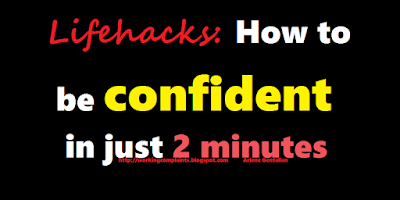Lifehacks: How to be confident in just 2 minutes
Lifehacks: How to be confident in just 2 minutes
By: Arlene Gentallan
When you step in front of a crowd, do you beam with confidence or do you tremble in fear?
Confidence is power. It's a trait people look up in awe. We need it in our school presentation, in our work, in our personal life. But, there are many people who struggle. How do trick yourself to become confident?
Did you know that there's a simple trick that can boost your confidence in as fast as 2 minutes. This isn't a joke, it's a trick backed up by research.
Mind your posture!
Just as faking a smile will give you happiness, so is assuming a dominant posture. Stand or sit in a way that makes you appear larger. Extend you arms and legs.
Researchers differentiated between "high power" posture and "low power" posture. A high power posture assumes an open relax position (i.e. sitting on a chair with both your hands behind your head or stand with your hands on your hips, chin up, chest out). Low power posture is closed shrink posture (i.e. slouching).
What is the science behind this trick?
It's all about hormones...particularly testosterone and cortisol. Testosterone is associated with feelings of positivity and confidence, while the stress hormone "cortisol" makes you feel anxious and stressed.
So, if you like to feel confident, you want a higher testosterone level and have a decrease cortisol level.
According to their study, assuming a high power pose increases testosterone level by up to 20% while it decreases cortisol level by 25%. It's amazing to think how a person's hormone level can fluctuate in just a matter of 2 minutes.
So the next time you have to step out in a crowd or you feel anxious, do the 2 minutes ritual of assuming a high power pose.
Stand straight, arms on your hips, chin up, chest out.
Sit straight, extend your arms and legs.
Take as much space as you could.
You know it helps.
Resource:
Carney, D. , Cuddy, A & Yap, A. (2010).Power Posing: Brief Nonverbal Displays Affect Neuroendocrine Levels and Risk Tolerance. Psychological Science. DOI: 10.1177/095679761038343
By: Arlene Gentallan
 |
| Lifehacks: How to be confident in just 2 minutes |
When you step in front of a crowd, do you beam with confidence or do you tremble in fear?
Confidence is power. It's a trait people look up in awe. We need it in our school presentation, in our work, in our personal life. But, there are many people who struggle. How do trick yourself to become confident?
Did you know that there's a simple trick that can boost your confidence in as fast as 2 minutes. This isn't a joke, it's a trick backed up by research.
Mind your posture!
Just as faking a smile will give you happiness, so is assuming a dominant posture. Stand or sit in a way that makes you appear larger. Extend you arms and legs.
Researchers differentiated between "high power" posture and "low power" posture. A high power posture assumes an open relax position (i.e. sitting on a chair with both your hands behind your head or stand with your hands on your hips, chin up, chest out). Low power posture is closed shrink posture (i.e. slouching).
What is the science behind this trick?
It's all about hormones...particularly testosterone and cortisol. Testosterone is associated with feelings of positivity and confidence, while the stress hormone "cortisol" makes you feel anxious and stressed.
So, if you like to feel confident, you want a higher testosterone level and have a decrease cortisol level.
According to their study, assuming a high power pose increases testosterone level by up to 20% while it decreases cortisol level by 25%. It's amazing to think how a person's hormone level can fluctuate in just a matter of 2 minutes.
So the next time you have to step out in a crowd or you feel anxious, do the 2 minutes ritual of assuming a high power pose.
Stand straight, arms on your hips, chin up, chest out.
Sit straight, extend your arms and legs.
Take as much space as you could.
You know it helps.
Resource:
Carney, D. , Cuddy, A & Yap, A. (2010).Power Posing: Brief Nonverbal Displays Affect Neuroendocrine Levels and Risk Tolerance. Psychological Science. DOI: 10.1177/095679761038343







